The COVID-19 Teachers' Guide
Disclosure: By clicking on the product links in this article, Mattress Nerd may receive a commission fee at no cost to you, the reader. Read full disclosure statement.
With the coronavirus pandemic in full swing teachers around the country are struggling to juggle the responsibilities of their job while adjusting to a new “normal.” Along the way, they’ve faced new challenges and stressors that have taken a toll on their mental health.
Teachers, we see you and acknowledge the major changes you are navigating through. As a result, we conducted a survey and reached out to 100 teachers across the country and asked them to share their struggles teaching during COVID-19.
Our guide uncovers the challenges teachers are facing and works to help them find realistic ways to manage their mental health and wellbeing. If you are a teacher struggling to find time for yourself and keep your head above water, breathe. We are here to help and tell you that you are not alone.
The Teachers We Consulted
Our teacher survey respondents range in age and years of experience and have all been faced with new challenges unique to their school systems, location, and personal circumstances.
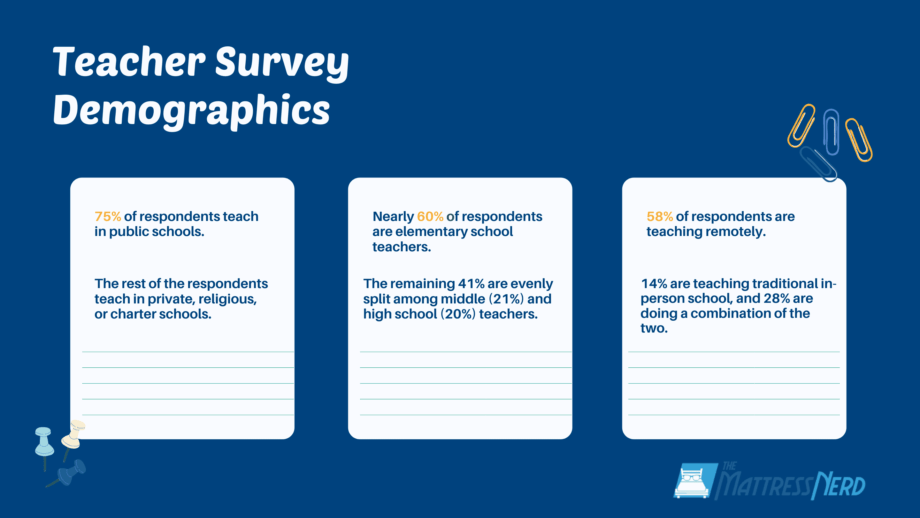
Stress & COVID-19
There’s no doubt the coronavirus pandemic is stressful. People are worried about their health and their loved ones, worried about the state of the economy, worried if and when life will get back to normal. Teachers are on the forefront, and the emotional and physical burden of it all weighs heavily on them.
“Teachers, like many other essential workers who are navigating the pandemic, are prime candidates for compassion fatigue — a distress response that presents as the reduced ability to be there emotionally for others,” states Sierra Hillsman, a licensed associate counselor, at Legacy Speaks.
How Teachers are Handling Stress
According to our survey’s respondents, a staggering 92% of teachers say they feel more stressed now than before the pandemic. Among them, 70% say they’d label their stress level as “significantly higher” compared to before COVID-19 began.
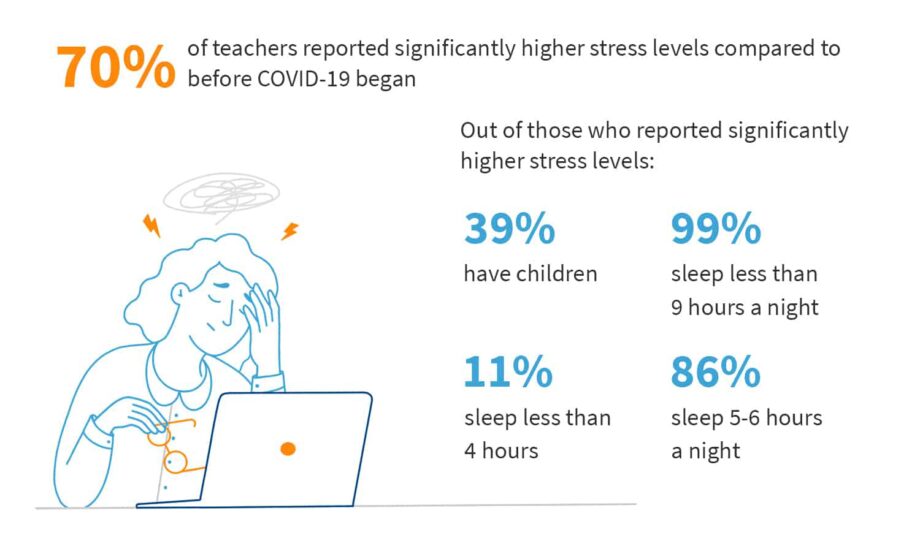
“We are expected to basically do three jobs but in the same time frame of one job,” says a 35-year-old public high school teacher balancing a husband and kids while teaching both online and in-person students.
Unfortunately, throughout the survey, the high amounts of stress continued to be a trend. When asked about how teachers were managing stress, a 54-year-old public high school teacher and survey respondent teaching in-person noted that keeping up with all the new rules and regulations to protect students from the virus has added to her stress.
“We have about three different classes in our room each day, and we have to disinfect everything in between classes, I’m exhausted!” she says.
But the overwhelming feelings don’t stop there, one teacher survey respondent notes: “We have to create virtual resources and video lessons and upload all this. We have to provide instruction to the students that are at [in-person] school. And somehow answer questions constantly for the [virtual] students. I have never worked this hard in my life.”
“I am at high risk due to chemo and lupus. [I] worry about my kids, my students. I’ve cried more this school year than in all my previous years combined,” says another teacher, fearing for her life.
This is not a surprise according to Dr. Sabrina Romanoff, a Harvard trained clinical psychologist working at Lenox Hill Hospital, Northwell Health, in New York City. “Many teachers at this point in the pandemic are experiencing burnout, which occurs when motivation or incentive loses its sustainability because one is not able to produce the anticipated results,” Romanoff states.
“In other words, when effort is not equivalent to the outcome, motivation to continue to sustain determination begins to waver,” Romanoff continues. She goes on to mention that stress can also be stored in the body and can have psychomotor symptoms such as stomach pains, headaches, and body pain.
But not all hope is lost, there are still ways for teachers to manage their stress even when they are going through a time in their careers that looks significantly different and poses unique challenges.
Ways Teachers Can Manage Stress
Teachers, the results of our survey have given us a clearer picture of the sacrifices you have made for our students and children all around the country, and we are here to share your struggles and help you manage your stress during these challenging times.
Use the following stress reduction tools so that you can take care of your needs and be the best teacher you can for your students:
- Talk to other teachers. A meta-analysis published in the journal PLoS Medicine found that having a good social network keeps us healthy and, in fact, increases survival by 50%. Unfortunately, government-mandated closures and stay-at-home orders to stop the spread of COVID-19 have isolated many of us. But social distancing doesn’t mean you cannot reach out to others, especially colleagues! So give your fellow teacher friends a call, vent on Facetime, or set up a time to take a walk. Doing so will reassure you that you are not alone in your suffering. And, you may even find ways to laugh about your challenges. Laughter, studies show, can actually be pretty good best medicine.
- Get outside. When pressure builds and feels almost unbearable, take a break and head out into nature. Whether it’s a stroll through your neighborhood or a trail in a nearby park, just getting outdoors can be hugely therapeutic. As Albert Einstein once said, “Look deep into nature, and you will understand everything better.”
- Escape for a weekend. Yes, it is possible to head out of town for the weekend and safely social distance. While escaping the confines of your stay-at-home desk may sound daunting, it is essential to take time for yourself to recharge and reset, even if it means taking a break from online grading. So consider renting a cabin in the woods or a condo on a lake with an equipped kitchen so you can prepare your own meals and make yourself at home. Just a few days away can help you destress and prepare yourself for the week ahead.
- Let it go. Just like the Frozen song that never seems to make its way out of your students’ heads, it is time to let it go! The online quizzes you need to grade, or the progress reports you have due can wait until the morning. Take a deep breath. Try to release that tight grip you have on trying to control the chaotic world around you. Focus on what you can manage and accept that you can’t control everything and keep hope, knowing that pandemics eventually end and one-day things will get easier.
- Take care of yourself. You’re teaching kids, managing anxious parents, and trying to keep your family safe. But, despite teachers being the closest thing we have to real-life superheroes, you can’t do any of it if you don’t take care of yourself first! Take time to be alone and unwind by listening to music or using guided meditation.
Unsure about meditating? There are some apps available that can talk you through the process. Meditating enables you to focus your attention and eliminate intrusive thoughts. By taking a few minutes to meditate, you reap the benefits of relaxation and stress reduction.
Hillsman also encourages teachers to increase self-awareness by identifying their needs and making peace with parting with what no longer serves them. “This [self awareness] will lead to strengthening self-advocacy skills and help teachers communicate and stand up for themselves based on their current experiences. Practicing relentless honesty with where you are emotionally and mentally helps create checkpoints before you find yourself at the end of the rope.”
Another thing you can do, according to Dr. Romanoff, is to shift your thinking. Learn to shift your bias from the negative and all you cannot do to all that you can. One way of doing this is with the 3 good things exercise.
“Every night write down three things that happened that day for which you are grateful. Research has found this to be an effective way to increase happiness because it increases gratitude and appreciation for all that you do have,” says Romanoff.
Still struggling to cope? Make an appointment to talk to a therapist who can help you process and may be able to lift some of the weight you have been carrying with you.
Mental Health & Sleep During COVID-19
Even before coronavirus became a “thing,” medical experts were concerned about increasing reports of insomnia and its impact on physical and emotional health. But the added stress of COVID-19 on our sleep has led to what some experts call a “second pandemic of insomnia.” Teachers are definitely not immune.
How Teachers Sleeping Habits Are Affecting Their Mental Health
To say that the added stress causes a lot of sleepless nights is an understatement. In fact, numerous studies have linked stressful events and anxiety to insomnia and insufficient sleep. Most adults need at least 7 hours of sleep each night to wake refreshed the next morning, according to the Centers for Disease Control and Prevention (CDC). Yet 55% of teachers who responded to our survey say they get less than 7 hours of sleep each night. And, 9% of them say they get less than 4 hours of sleep.
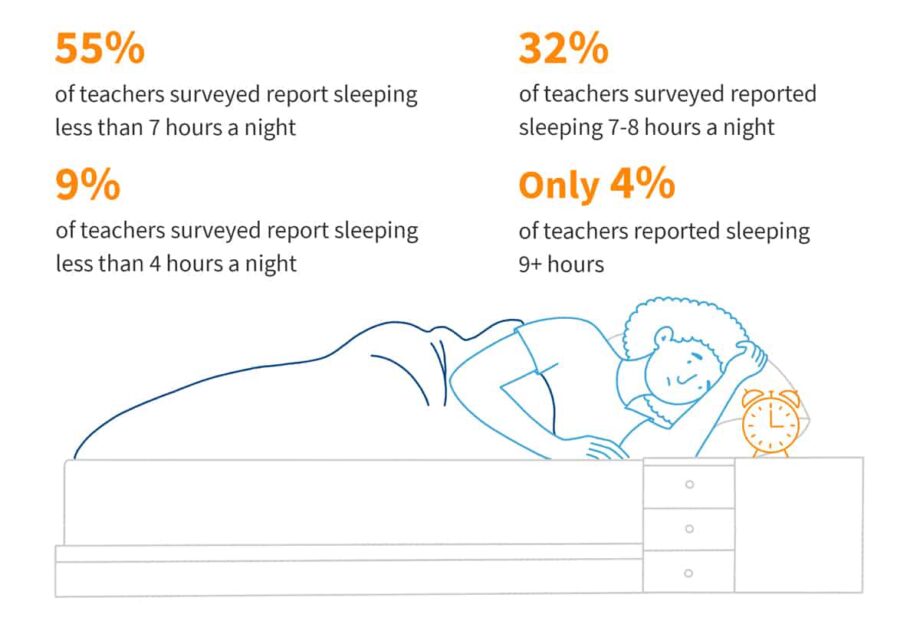
“I never used to wake up, now I wake up four to five times [a night],” says a 38-year-old single mother and teacher working remotely for a Title I public elementary school. “I’m always exhausted.” “I am constantly unable to sleep because I am either up late working or thinking about all the things I need to do the next morning or day,” says a 35-year-old married mother teaching both in-person and virtual classes at a rural public high school.
The majority of teachers in our survey who reported getting insufficient sleep say that COVID-19 is affecting their mental health as well. This causes a reciprocal effect. Stress and anxiety can make it difficult to fall asleep or stay asleep, and a sleep deficit can cause or worsen mental health conditions.
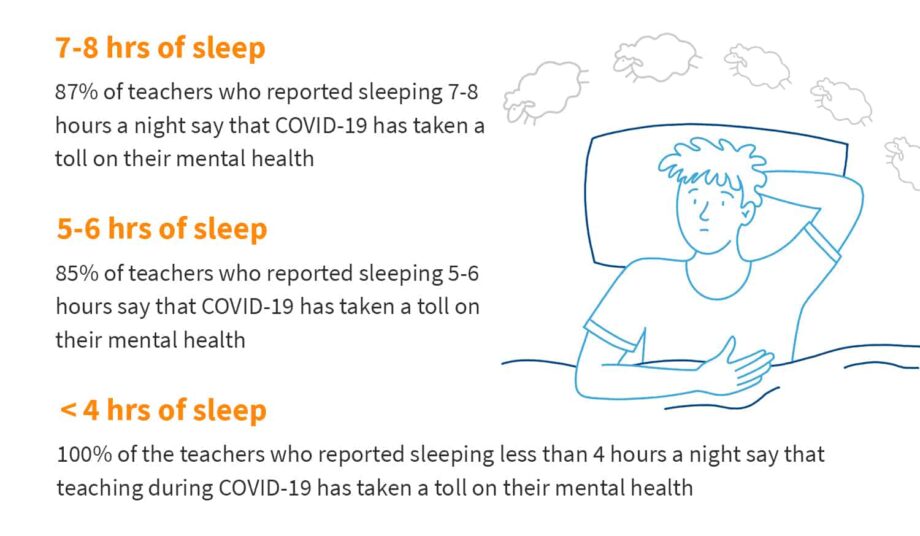
Improving Sleep & Well Being
Improving your sleep may seem like a daunting task. But it is not hopeless. Here are some suggestions for helping you get the sleep you need in order to be your best.
- Get in a routine. Many parents know that establishing a bedtime routine for their little ones helps them to wind down so they can fall asleep easier. As a teacher, I am sure you can see the effect a good night’s sleep can have on your students’ mood, focus, and engagement. Sleep is just as important in maintaining all of those things for you, and establishing a night routine is also a great idea for adults. About 30 minutes before bedtime, turn off the TV, take a warm bath, and allow yourself to unwind before light’s out.
- Improve your sleep environment. As a teacher, working long hours and devoting your energy to your students for hours at a time, your bedroom should be your sanctuary, reserved for sleep and sex only. It also should be inviting for both. Keep the room cool (experts recommend between 60-68 degrees), use blackout blinds to block out unwanted light, and consider investing in a new mattress with optimal pressure relieving qualities to help you sleep better and wake feeling refreshed.
- Avoid stimulants. Resist reading your mobile phone or tablet or checking parents frantic emails about what math worksheet is due tomorrow before bed. Your device emits blue light, which can have a stimulating effect and trigger feelings of alertness. For this reason, you want to avoid screen time as well as caffeine and nicotine later in the day, as they tend to stimulate the mind and prevent you from getting your zzzs on.
- Schedule Worry Time. As strange as it sounds if you’re prone to worry, set aside 15 minutes each day to fret about things. Use this time to make a list of your worries and focus on them. When the time is up, fold up the list and, literally, put away your worries. By scheduling “worry time” earlier in the day, you can more easily set aside your fretting at night when you’re trying to fall asleep.
- Relaxation Exercises. As you settle into bed, try to relax by doing breathing exercises, meditating, or just mellowing out to soft music.
“Pain is inevitable in life, but suffering is optional – even in a pandemic!” says Dr. Romanoff. “The difference lies in our interpretation and perception. To be more deliberate about your mindset, first, you need to distinguish factors that lie within and beyond your control. Then, learn to reduce your reactivity and bias to dwell on the negative. This is an exercise of self-control and discipline as it requires you to constantly filter out the negative bias and instead challenge yourself to consider the alternatives”
Work/Life Balance During COVID-19
It’s difficult enough to juggle a full-time job and responsibilities to family and friends. But when your job has suddenly become more stressful and, in many cases, more time-consuming, it can feel downright overwhelming, especially when your students’ parents are relying on you more now.
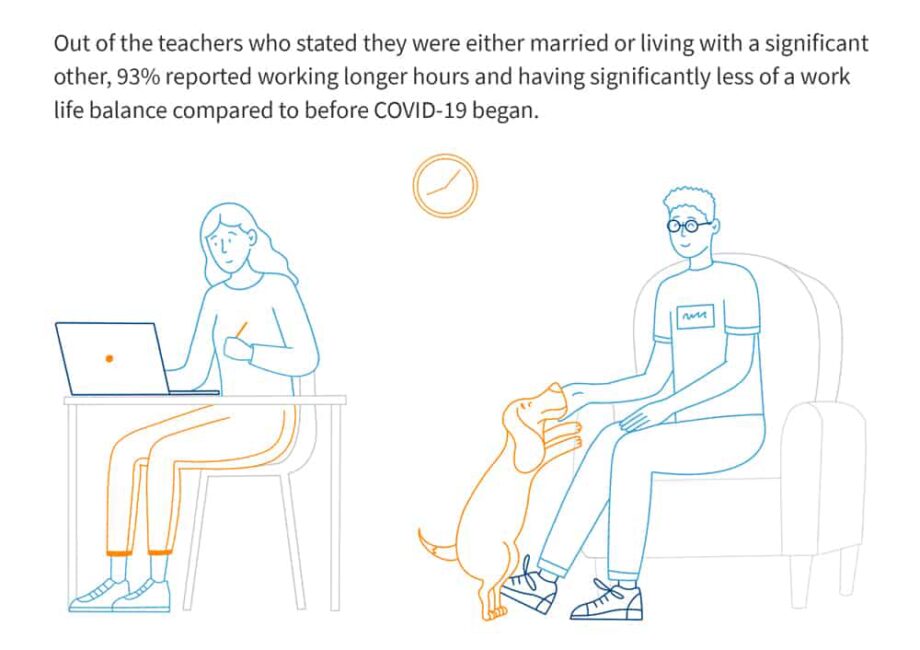
“I am constantly communicating and definitely out of school hours — serving as the parents’ therapist, kids’ teacher, and full support system,” says the 25-year-old elementary teacher working remotely for a middle school.
“Work takes up about 95% of my life,” adds a 45-year-old elementary school teacher who is teaching both in-school and remotely while also juggling the responsibilities of being a wife and a mother. “The other 5% is making dinner, doing laundry, and staying in touch with friends and family.”
“My husband is a daily reminder that I am neglecting my family due to long work hours,” says another teacher. “Also, I had to take my own child to daycare — knowing that the pandemic is still out there and real — just to be able to work at home without noise. I think it is unfair because my child is not immune to the disease, yet the district expects teachers to be online and virtual, putting our own family at risk daily to complete their online priorities all day long. It has taken a mental toll on me. I stress over my child daily, and these work hours have made me tired. At times I just want to quit my job. I’m so stressed out daily.”
Most of the teachers who responded to our survey say they are either married or living with a significant other. But even single teachers are having a difficult time managing their jobs and their personal lives.
“During the week, I don’t really have a personal life because there is a lot to do once I am home,” says a 25-year-old single middle school teacher. “I try to keep Saturday as a day of rest, but Sunday afternoons and evenings are dedicated to preparing for the upcoming week.”
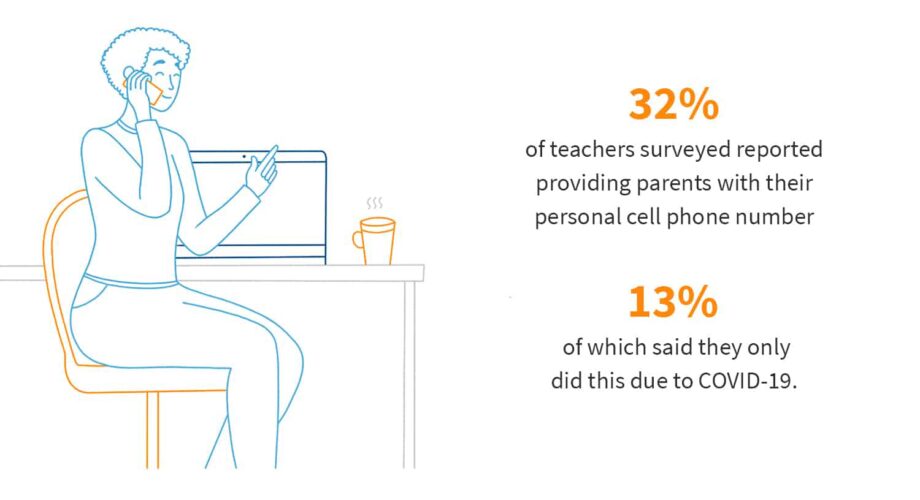
Improving Their Work/Life Balance
Suddenly changing from a traditional in-person school to one that is entirely or partly virtual can be more time consuming because you’re learning an entirely new way of teaching. Add in family responsibilities, and it can be exhausting. Here are some tips on how to make time for both work and yourself.
- Separate “work” and “play” spaces. Assigning a space within your home dedicated entirely to work can help you stay focused when working remotely. And, it’s a space you can walk out of at the end of your workday to help you literally walk away from the stress of your job.
- Believe in the value of what you’re doing. It’s more difficult to reap the benefits of your work when your students are virtual. But teachers change students’ lives every day even if you don’t realize it. In fact, you may never know the full impact of your good work. You just have to have faith in what you are doing. The same thing goes with family. You may never hear your child thank you for the meal you whipped up in your limited spare time or the dinner you ordered to be delivered. But your child will remember how you cared for them even during the most challenging times, and so will your students. Don’t lose sight of the important role you play in their lives each and every day.
- Learn to say no. You can try, but you can’t do everything. Say you’ve always been a stickler for assigning homework every night of the week, but now you’re too overwhelmed to check it regularly. Or, you have always made time at night to cook for the family, but now you feel too rushed. Perhaps it’s time to scale back on one or the other. It doesn’t make you a bad teacher or a bad parent. It makes you human. So learn to say no to things that make you feel like you have bitten off more than you can chew and remember for every “no” you say, you give back time to yourself.
Job Satisfaction & COVID-19
There are times teaching can feel like a thankless job. Teaching during the coronavirus pandemic is no different and, in some cases, may be worse. Many teachers feel that their concerns about returning to in-person school aren’t being heard. This has taken a toll on teachers’ overall job satisfaction.
Our survey found that 68% of teachers feel less satisfied with their jobs than they did before the pandemic. At least a third of them report feeling “significantly less satisfied.”
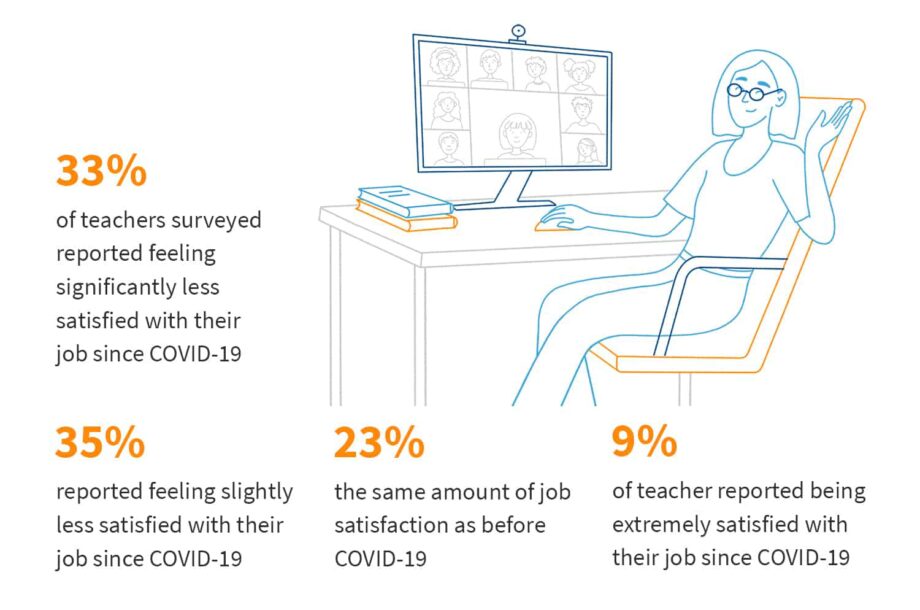
“I’m always drained. I feel like I’m failing like a teacher. I just feel blah all the time,” says one teacher. “I’ve thought about changing my career more than I ever have.”
“I feel more stressed and anxious about everything — the state of the world, exposure to the virus, and my work. I feel added stress teaching under a microscope, parents who are not understanding, administrators that are not supportive or understanding, students that are falling between the cracks. It all weighs too heavy on my heart and mind.”
But there are some silver linings to the COVID-19 cloud. “I’m talking to parents all hours of the day and on weekends,” says a 28-year-old elementary school teacher working remotely for a Title I school that serves mostly low-income families. “I actually feel more connected to my parents this year than ever before.”
The pandemic has also been a wake-up call to parents, giving them a much better perspective of the challenges teachers face teaching the younger generation. “I’m glad more and more people are recognizing what teachers do in terms of instruction and learning,” wrote Gretchen Weber, Vice President of Policy, Practice, and Systems Change for the American Institutes for Research, one of the world’s largest behavioral and social science research and evaluation organizations. “If ever there was a year to make Teacher Appreciation Week the biggest celebration ever, this is the year.”
The Takeaway
Finally, we asked teachers to tell us what is weighing most on their minds during this stressful time. Many express concern and compassion for their students.
“My students balance more responsibilities than any fifth graders I know. Because [my students] are at home, grownups are asking them to be babysitters, caregivers, parents, money makers, and students all at once,” one teacher says.
“When they come off mute to share, I can hear how distracting the workspace they are in is. Many of my students have babies bouncing on their laps during class or have to make food for siblings.”
Another teacher says, “I am definitely more worried about my students now. I go above and beyond for them in the virtual setting. I know this is part of the reason I work so much and I am stressed. But I feel obligated to make sure they are OK more often now because their mental health is important, too. I definitely have the mindset that their mental health is more important than my own.”
And, they feel frustrated with the lack of support on many levels.
But beyond it all, there is a guiding light that gives them strength. As one teacher says, “We’re all in this together.”
COVID-19 has rewritten the syllabus of our lives. It has changed up our routines and upended our expectations. Whether educating students behind a mask, in person at a social distance or virtually from a computer screen, teachers have stepped up to the challenge. We know some of you have done so tepidly, concerned for your health and the health of your family. We see you, and we applaud you for stepping into the unknown.
If there is a positive spin in all of this, it’s that COVID-19 has changed perspectives. Parents now see and appreciate the extraordinary efforts educators make to reach our children and the passion that drives them every day. Even students have come to appreciate the educational and social importance of school.
We hope that teachers see that we care, take time to care for themselves, and reach out to other teachers going through the same challenges. As one teacher in our survey says—and we couldn’t agree more: “We’re all in this together.”



